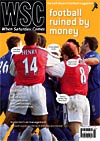 When it comes to the manager's job, clubs are rarely in doubt whether they should, as Ron Atkinson would say, stick or twist. But would it make sense to hold their nerve when things go wrong? Paul Giess gives his opinion on his club Walsall
When it comes to the manager's job, clubs are rarely in doubt whether they should, as Ron Atkinson would say, stick or twist. But would it make sense to hold their nerve when things go wrong? Paul Giess gives his opinion on his club Walsall
Twenty-four hours after a struggling Walsall side tamely lay down and died in a local derby at neighbouring West Bromwich on January 20, the club’s owner Jeff Bonser was forced into “the most difficult decision I have ever had to make”. Supporters were left to digest the most difficult news many had ever had to hear as news of Ray Graydon’s dismissal filtered through the local radio and newspapers.
True, a run of poor performances culminating in the televised defeat at the Hawthorns had left the club third bottom of the First Division, with one of the league’s worst away records (six points from 42). However, it was equally true that with 16 games still to play the club were just one place away from their highest league finish for a quarter of a century.
Graydon had done much to put an unfashionable club on the national map, winning admiration and respect from almost everyone who came into contact with him. He remained a true gentleman in victory or defeat. At the end of last year’s play-off final success, he did not even contemplate celebrating until he had commiserated with the deflated Reading players and staff.
Despite being allowed to sign only one player for a transfer fee in his three and a half years at the club, he never once complained publicly and was loyal to the board that sacked him, up to and including his dignified personal statement on the day of his departure. At a club whose record transfer payment is still £175,000 for Alan Buckley (in 1979), he moulded a never-ending stream of free transfers and obscure foreign trialists into a promotion-winning side – twice. At a time when player and agent power rules the game Graydon developed a team ethic based on controlled aggression. He took his players’ red cards and suspensions as a personal insult.
In 1998, his appointment had been met with ridicule by supporters. Despite inheriting a club with fewer than ten first-team players, he took Walsall to promotion in his first season as a manager, prompting the then treble-winning Alex Ferguson to suggest that Ray was the real manager of the year. Everyone in football seemed to agree. During the final game of that season against Fulham, Kevin Keegan strode onto the Bescot Stadium turf, embraced Graydon and handed over his Second Division manager of the year award.
Walsall have been promoted to their current level only four times. Graydon achieved two of these in just three years. Now, barely seven months after giving the club its biggest ever pay day and its supporters their two most memorable games – defeating Wolves at Molineux in 1999 is right up there alongside the appearance at the Millennium Stadium – he becomes the season’s 30th managerial casualty.
Walsall fans have lived in constant fear of Graydon’s departure to bigger and better things. All our big neighbours have had a sniff in the past three years. Now the man still considered by most of the Bescot faithful as the best manager in the club’s history has gone through the club’s own choice. Defending the decision, Bonser said: “The club is now entering a transitional phase.” We know. It’s called relegation and we deserve it.
From WSC 181 March 2002. What was happening this month